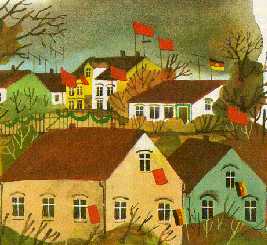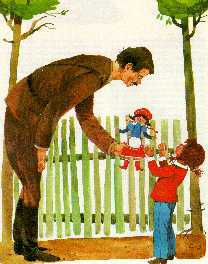


Background: The GDR encouraged interest in the military at an early age. This is a story from a book for children that presents the military in a favorable way.
The source: Die sieben Brüder (Berlin: Verlag Junge Welt, 1985) pp. 38-41.
by Dietrich Herfurth
The maneuver was called “October Storm.” It was October, and the weather was turbulent., not only when the tanks rolled over the harvested fields and the lightning-fast fighter jets sped over the heads of the soldiers.
It would be a turbulent day for Brenbach as well, even thought a one-day break was scheduled.
They were expecting friends. Over a thousand men from four different armies. Brenbach did not even have a thousand residents! It was a half dozen kilometers away from the highway, and the “road” that went through the village was noted on the district map only as a dotted line!
Not even the oldest residents of Brenbach could remember when Brenbach had had a thousand guests. For a week the residents of Brenbach had been competing with each other in contests of sweeping and raking and painting and cleaning. The store was sold out of flags, and the blacksmith was busy making flag holders. The children’s brass group practiced, the FDJ group prepared a place to celebrate, set up flagpoles, cleared away shrubs, and filled in a ditch.
A thousand soldiers! They would come from Moscow, Warsaw, and Prague. Of course soldiers would come from Berlin and Erfurt, too; they were all coming to Brenbach. They should feel content and at home.
The mayor walked through the village. contently he boomed over and over
again “Nice, very nice!” The houses gleamed a fir green and
were decorated with flowers. Banners fluttered from freshly painted fences,
and in the front gardens brilliant white flags with welcoming greetings
waved in the wind. One could sense already the mood of this festive day
in the happy faces, in the giggles here and there, and by the first sounds
of the trumpet. 
But on the morning of the big day the people ducked their heads, furrowed their brows, licked the rainwater from the corners of their mouths, and held their caps tightly, so that they did not fly away. It had been raining and storming for hours already. Look at the houses! Tattered pieces of flag hung from the trees. The grounds were a muddy mess. Every other flagpole had fallen over. But the worst of it was how the people looked at the scene, disappointed and disheartened.
The weather report had said “No precipitation.” But it did not know about Brenbach’s hills, this windy region in which each corner of the forest had its own weather. Britt and Bert, the trombone and the base drum players of the children’s orchestra, resolved that it could not go on like this. Something must happen. But what? Suddenly they tightened up their jackets and ran to the meadow where the sheep were grazing. Out of breath, they asked the shepherd Paul Weidig: “What will the weather be like today? This afternoon?”
The shepherd looked at them reproachfully: “How could you run through wet grass in sandals? You’ll catch your death of cold.”
“Ya, ya, but we just have to know if it is going to rain at four!”
He had a staff and a big hat to keep the rain off. He looked to the forest and over the mountains, looked at the sheep and scrutinized how they ate the green grass. He said, much too slowly for the both of them, as if it were completely unimportant: “At four? At four the sun will be shining.”
They ran back to the village, again over the wet meadow. Britt brought the orchestra together, and Bert painted a large sign in the Young Pioneers’ room: Sunshine at 4 o’clock Paul Weidig
Shortly before lunch the orchestra played while walking through town carrying the banner. The people looked out from behind their curtains at the procession with amazement and disbelief, but then they laughed and shook their heads, wondering: Look at these boys! Are they teasing us? Or should we believe them?
And what happened? Even though it was still drizzling, the streets came alive, and small rays of sunshine broke through the clouds. First the FDJers ran out, then the men with shovels over their shoulders, and soon the large wagon pulled by horses and carrying women with food for the concession stand.
Five minutes before four o’clock. The entire village was gathered at the grounds. Flags waved on newly-raised flagpoles.
The booths opened. The coals in the grills spit out heat and smoke. The
aroma of fatty sausages sizzling was everywhere, like you’ll only find
in Thuringia.

Now a deep roar was audible, and all the people walked to the street, as if they had been commanded to do so. There they were!
A sparkling banner fluttered from the first tank, held by soldiers from four armies.
A Soviet brass band played from the second, blowing as hard as they could to drown out the growl of the following 20, 30, 40 amphibious tanks.
The sun broke through the clouds, and was reflected in the trumpets and
trombones, sparkling in a thousand droplets that still hung from the leaves
and stems.
Vehicle after vehicle stopped. Tthe soldiers disembarked and fell into line. Songs rang out and conversations stopped. The best was when a Soviet soldier said: “It is just like being at home in my own village.”
Now it was Britt and Bert’s turn with their orchestra. They played: “We Are Friends Forever.” Then the girls and boys stormed the soldiers’ ranks; their “guns” were flowers, their Pioneer scarves and — here and there — their elbows. The soldiers launched a “counter-attack” with badges, maneuver postcards, and autographs. The ranks dissolved without command, and in the end both sides were winners, the Young Pioneers of Brenbach having a clear advantage.
The next day the newspapers were full of pictures from the event. One picture was printed the most: it showed the orchestras of Soviet soldiers and young Brenbach Pioneers. Especially recognizable were Britt with his trombone and Bert with his base drum. That picture was printed in Polish, Czech, and Soviet newspapers, and most of the readers — some who even lived in Vladivostok, almost on the other side of the world — discovered something about Brenbach, the citizens of Brenbach, and the children of Brenbach for the very first time.
[Preliminary translation by Katherine Lynch. Page copyright © 2000 by Randall L. Bytwerk. My e-mail address is available on the FAQ page.]
Go to the “Seven Brothers” Page
Go to the GDR Page.
Go to the German Propaganda Archive Home Page.